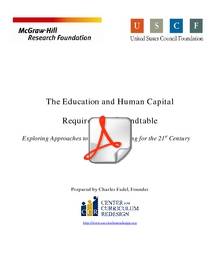NEW YORK, NY--(Marketwire - May 17, 2012) - As technology increasingly eradicates traditional jobs faster than individuals can learn the skills necessary to adapt, the fundamental process of how we educate and train people must be revisited. In order to address the needs of the 21st-century economy, educators, policy makers and the business community should develop a common global approach to education, skills development and lifelong learning. Suggested approaches include building resilience into curriculums and shifting the focus from either/or knowledge or skills training to an area that includes both.
This is the conclusion of a new white paper from the United States Council Foundation, the educational arm of the United States Council for International Business (USCIB), and The McGraw-Hill Research Foundation. Summarizing the conclusions of a Roundtable on Education and Human Capital Requirements held earlier this year, the paper calls for a continuous, cogent conversation to respond to the global and personal challenges of the 21st century. Rejecting efforts to elevate science, technology, engineering and mathematics (STEM) over the humanities or other disciplines in favor of a more flexible approach, the paper encourages educators to address both individual learning styles as well as the changing demands of the workplace.
"It became clear at the Roundtable that we do not have a coherent strategy to skills development that will meet the economic needs of the 21st century," according to Peter M. Robinson, USCIB's president and CEO. "Research is fragmented among stakeholders, with business, educators and policy makers each looking at the problem through their own prism. We need a global, multi-disciplinary approach to solving the problem."
"Disruptive events around the world underscore dramatic changes occurring in societies; yet one truism remains unchanged: the key to unlocking a brighter future is forged in education," noted James H. McGraw, IV, president of The McGraw-Hill Research Foundation. "If we are to tackle the problem of stubbornly high unemployment and meet the job needs of global employers over the long term, we need to embrace a wide range of ideas about education and consider new possibilities."
The paper offers a number of suggestions made at the Roundtable to help improve education, including:
- Focus first on early childhood, where the best return on investment lies. Among other techniques, pair each child with a caring adult, if a caring parent is not available -- this has been shown to have the largest single impact on a child's future chances.
- Build resilience into education systems, improving their ability to respond to rapidly changing needs by allowing for as much as thirty percent or more of customization and adaptation of curricula (which will have the extra benefit of being better adapted to each child's needs and learning styles).
- Push for mastery of the foundational curriculum through middle school -- the "table stakes." Be explicit about STEM's and Humanities/Arts' complementary role and value. Emphasize quantitative literacy and applied mathematics for all, not just for the few who get into STEM jobs.
- Focus on processes to reach deep understanding of the knowledge areas covered. Shift the mindset from knowledge OR skills to knowledge AND skills, and focus on both knowledge and its applications through creativity/innovation, critical thinking, communication, and collaboration.
- Improve the connection between school and work-based learning via apprenticeships and internships. Open up the teaching profession to practitioners from the world beyond the educational environment, moving back and forth between the two, or shouldering teachers.
- Rethink the front-end-loading of education, as in many cases formal education is continuing well into adulthood via personal re-skilling and corporate training. Develop micro-credentialing and "stackable" certificates, which would evaluate and validate skills.
- Develop a better understanding of the role of corporate training and development and its contribution to life-long learning, as business and corporate training is currently much larger than the entire U.S. higher education sector.
- Place increased value on informal learning avenues (such as after-school programs, museums, etc.) as critical supplements to the inevitable gaps of formal learning.
"What is clear is that there is an urgent need to bring to the fore a deeply cogent, synthetic, open-minded and continuous conversation," said Charles Fadel, author of 21st Century Skills and founder and chairman of the Center for Curriculum Redesign, which prepared the white paper for the Roundtable on Education and Human Capital Requirements.
The United States Council Foundation and The McGraw-Hill Research Foundation will convene a second Roundtable to focus on the white paper's suggestions for immediate action and identify key areas for further study and research.
To read the report: http://mcgraw-hillresearchfoundation.org/wp-content/uploads/2012/05/Education-and-Human-Capital-Requirements_WP.pdf
To view excerpts from interviews with Roundtable participants: http://www.youtube.com/watch?v=hnvokzRkyu4&feature=youtu.be
About the United States Council Foundation: The United States Council Foundation, Inc. is a private 501(c)(3) organization affiliated with the United States Council for International Business. It undertakes educational activities to promote the benefits of a free market economy, demonstrate and document the role of the corporate private sector in economic growth and social development, and advance sustainability in environmental management. Additional information is available at www.uscouncilfoundation.org. Contact: Jonathan Huneke, +1 212.703.5043, jhuneke@uscib.org.
About The McGraw-Hill Research Foundation: The mission of The McGraw-Hill Research Foundation is to support organizations, projects and activities that are advancing global education and knowledge in the 21st century. The Foundation was established with the support of The McGraw-Hill Companies and is a Section 501(c)(3) organization. Additional information is available at www.mcgraw-hillresearchfoundation.org. Contact: Jason Feuchtwanger, +1 212.512.3151, jason_feuchtwanger@mcgraw-hill.com.
About the Center for Curriculum Redesign: "What should students learn in the 21st century?" The mission of the Center for Curriculum Redesign (CCR) is to answer this timely question, and openly propagate its recommendations and frameworks on a worldwide basis. The CCR brings together non-governmental organizations, jurisdictions, academic institutions, corporations, and organizations including foundations. Additional information is available at www.curriculumredesign.org. Contact: Charles Fadel, charlesfadel@gmail.com.
Contact Information:
Jonathan Huneke
+1 212.703.5043
jhuneke@uscib.org
Jason Feuchtwanger
+1 212.512.3151
jason_feuchtwanger@mcgraw-hill.com
Charles Fadel
charlesfadel@gmail.com
